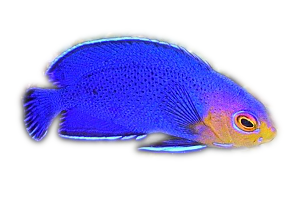
By Bob Goemans

The ability to mix butterflyfishes with corals would be a wonderful boon to most reef aquarists as their beauty and coloration are second to none, and combining them doubles the pleasure. This can be a reality if care is taken to choose those fishes that are reasonably safe for the corals an aquarist wishes to keep. The lists shown below have been compiled by two prominent figures in the marine hobby: Bob Goemans, and Dr. Vincent Hargreaves. Just bear in mind that there are very few butterflyfishes that are considered even "relatively safe" around both hard and soft corals, and by no means does this list imply that all fishes under each category pose zero threat. There will likely be some sampling taking place on occasion, but in larger, well stocked reef systems where the aquarist offers a proper and nutritious diet closely matching their natural food source, the damage is likely to be unnoticeable. Again, the key word is "relatively" safe, as there are many aspects that still need to be realized, researched, and taken into consideration before one can be assured that a given butterflyfish will be completely safe around his or her corals.
An (E)asy, (M)oderate, or (D)ifficult description has been placed for each fish indicating the degree of difficulty for keeping. It is also recommended to research fish before buying to ensure you can provide for their needs.
If Keeping Stony Corals, The Butterflyfish Listed Below Are Relatively Safe
Chaetodon citrinellus (Speckled Butterflyfish/Citron Coralfish) D
Chaetodon collare (Pakistani/Red-Tail/Collare/Brown) M to D
Chaetodon lunulatus (Redfin Butterflyfish) D
Chaetodon humeralis (Sea of Cortez Three-banded/East Pacific Butterflyfish) D
Chaetodon multicinstus (Multiband/Pebbled/Hawaiian Striped Butterflyfish) D
Chaetodon pelewensis (Dot-and-Dash Butterflyfish) M
Chaetodon punctatofasciatus (Spotbanded Butterflyfish) M
Chaetodon guttatissimus (Spotted Butterflyfish) E to M
Chaetodon rafflesii (Raffles's/Latticed Butterflyfish) E to M
Chaetodon reticulatus (Reticulated Butterflyfish) D
Chaetodon striatus (Banded Butterflyfish) E
Chaetodon trichrous (Tahiti Butterflyfish) E
Chaetodon vagabundus Vagabond Butterflyfish) E to M
Chaetodon wiebeli (Wiebel's Butterflyfish) E to M
Chaetodon xanthocephalus (Yellow-Head Butterflyfish) D
Forcipiger longirostris (Longnose Butterflyfish) M to D
Hemitaurichthys polylepis (Pyramid Butterflyfish) M
Hemitaurichthys zoster (Black Pyramid Butterflyfish) E
Heniochus chrysostomus (Pennant or Three Band Butterflyfish) E to M
Heniochus varius (Brown/Horned/Humphead Butterflyfish) M to D
Prognathodes aculeatus (Atlantic Long Snout Butterflyfish) M
Prognathodes aya (Bank Butterflyfish) M
Prognathodes brasiliensis (Brazilian Butterflyfish) M
If Keeping Soft Corals, The Butterflyfish Listed Below Are Relatively Safe
Chaetodon auriga (Threadfin Butterflyfish) E to M
Chaetodon baronessa (Triangular Butterflyfish) D
Chaetodon falcula (Saddleback Butterflyfish) M to D
Chaetodon guttatissimus (Spotted Butterflyfish) M to D
Chaetodon kleinii (Klein's Butterflyfish) E
Chaetodon multicinstus (Multiband/Hawaiin Butterflyfish) D
Chaetodon octofasciatus (Eight Banded Butterflyfish) D
Chaetodon plebeius (Blue Spot/Coral Butterflyfish) D
Chaetodon punctatofasciatus (Spot Banded Butterflyfish) M
Chaetodon rafflesii (Latticed Butterflyfish) E to M
Chaetodon xanthurus (Pearl Scale Butterflyfish) E to M
Chelmon rostratus (Copperband Butterflyfish) M
Hemitaurichthys zoster (Black Pyramid Butterflyfish) E
Prognathodes aya (Atlantic Long Snout Butterflyfish) M